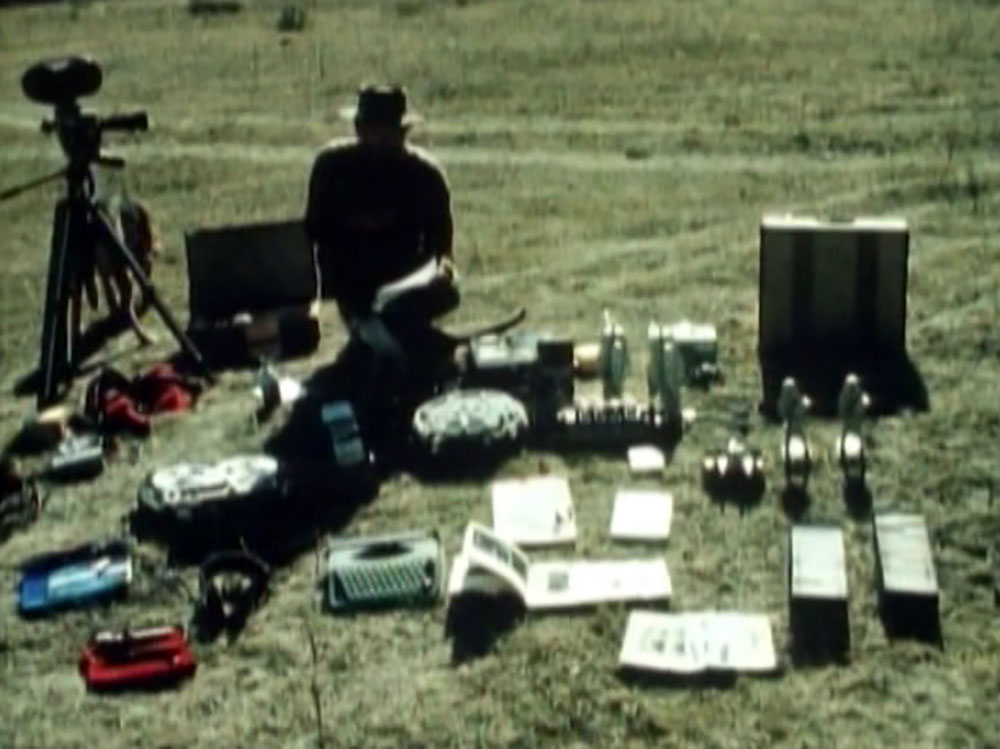In 1968, Jon Jost became one of the founding members of the Chicago branch of Newsreel after serving a two-year prison sentence for refusing the Vietnam draft. A little over a year later, he left the organization because he was frustrated by its top-down relationship with the central Newsreel office and their decision to privilege heavy-handed political films coming out of New York. Eventually, Jost ended up in a cabin outside of Eugene, Oregon, with his friend Elayne Ketchum. It was there that he made Speaking Directly: Some American Notes (1974).
This early example of the American essay film indicates an inflection point in Jost’s career as he shifted away from explicitly experimental work such as City (1964) and Canyon (1970) toward the low-budget narrative features like All The Vermeers In New York (1990) and The Bed You Sleep In (1993) that he eventually became known for. Speaking Directly provides insight into the rationale behind that shift. Jost was a politically committed filmmaker who was also interested in the aesthetic value of films, but felt that those two sensibilities had become mutually exclusive as the optimism of the late ’60s turned into the cynicism of the ‘70s. As such, Speaking Directly develops a scathing self-critique of Jost as a typical white American male artist who seeks to respond to the Vietnam War, but whose work cannot incorporate the fact that the war’s violence structures every facet of American life. Jost’s camera constantly reminds the viewer of this connection by focusing on his bucolic surroundings before panning and revealing the ugliness that lies out-of-frame—a friend acting the part of a bloody corpse that evokes the Kent State and Jackson State killings, or highways that gesture at the destruction of the nation’s natural landscape.
Speaking Directly also mounts a feminist critique of cinematic representation, as Jost repeatedly reveals the patriarchal power dynamics that inflect his most intimate relationships and how they are tied up with the group task of making a low-budget film. The film contains a section titled “Elayne (you),” in which Jost attempts to give Elayne Ketchum a voice through a series of partially-completed interviews. During this sequence, Ketchum describes her relationship with Jost and argues that it represents the fundamental incompatibility between the sexes, even if she finds herself unable to explain why. For her, the process of speaking to the camera, into a microphone, and to an imagined audience is “excruciating.” Jost displays these uncomfortable moments and seems to revel in them; as if to prove her point about men and women, he includes imagery from advertising and pornography that both fetishizes and silences female subjectivity. Later on, he exhaustively narrates the funding, equipment, and unpaid labor (mostly from Ketchum) he used to complete the film, as well as the exploitation of natural resources needed to manufacture cameras, film, and other equipment. Ultimately, he declares that in order to show an accurate representation of how the film was made it would be necessary to show the entire world; anything else is a lie by omission.
The Film-Makers’ Coop has programmed Speaking Directly as part of a series centered around the work of the Dutch leftist sociologist, filmmaker, and film distributor Leonard M. Henny, whose company Films for Social Change distributed Newsreel films in the Netherlands and worked with the Dutch filmmaking collectives Cineclub Vrijheidsfilms and Amsterdam Newsreel. The Coop is currently restoring their collection of Henny’s films in collaboration with the Eye Filmmuseum in Amsterdam. This represents a crucial step toward illuminating the many cross-connections between radical cinema collectives in the United States and the Netherlands. The program’s internationalist flavor is useful when it comes to approaching Speaking Directly, which reflects a uniquely American perspective on anti-imperialism. After making Speaking Directly, Jost continued to address American citizens’ complicity in the US’s violence abroad, as in the omnibus Far From Afghanistan (2012)—a nod to the anti-Vietnam film from 1967. Jost’s refusal to accept this complicity offers moral clarity that is instructive for politically committed filmmakers working today, lest they normalize the horrific massacres supported by the United States in the present.
Speaking Directly: Some American Notes screens this evening, April 17, at The Film-Makers’ Coop on 16mm as part of the series “Films For Social Change: Revisited and Expanded.”



